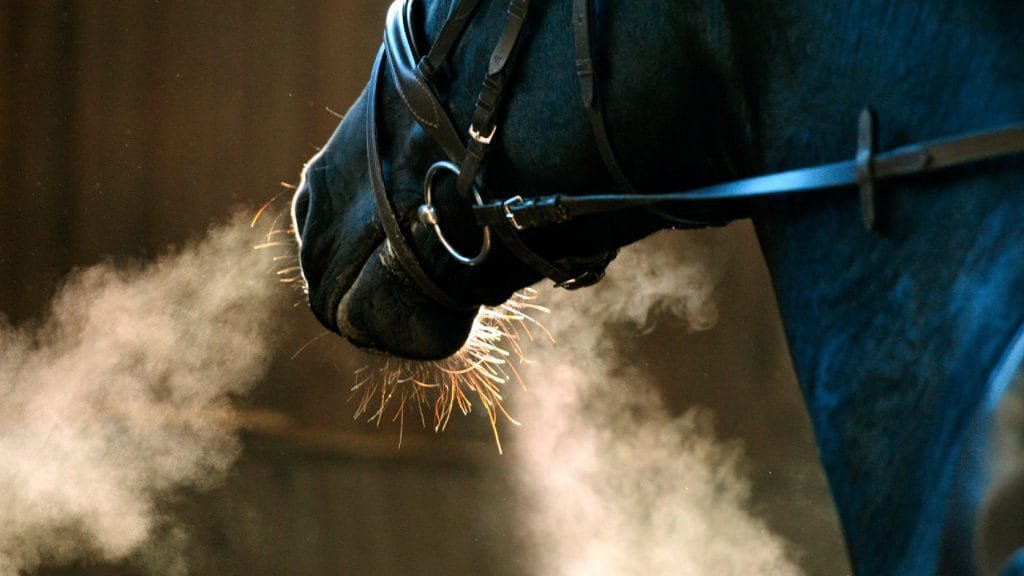Just like humans, horses rely on their respiratory system to stay healthy and perform at their best
horse’s respiratory health is crucial for its overall well-being, whether it’s a show jumper, a racehorse, or a beloved family companion.
How the Horse’s Respiratory System Works
A horse’s respiratory system is responsible for taking in oxygen and expelling carbon dioxide. This system includes the nose, throat, trachea (windpipe), and lungs. When a horse breathes in, air enters through the nostrils, travels down the trachea, and into the lungs. Here, oxygen is exchanged for carbon dioxide in the blood. The carbon dioxide is then expelled when the horse exhales.
Common Respiratory Issues in Horses
- Heaves (Recurrent Airway Obstruction – RAO): This is a common condition similar to asthma in humans. It’s often triggered by inhaling dust or mold from hay and straw. Horses with heaves may cough, have nasal discharge, and show labored breathing.
- Influenza and Other Viruses: Just like people, horses can catch respiratory viruses. Equine influenza is highly contagious and can cause fever, cough, and nasal discharge.
- Pneumonia: This is an infection of the lungs that can be caused by bacteria or viruses. Symptoms include coughing, fever, and difficulty breathing.
- Strangles: This is a bacterial infection that primarily affects young horses. It causes swelling of the lymph nodes, fever, and nasal discharge.
- Sinusitis: This is an inflammation of the sinuses, which can cause nasal discharge, facial swelling, and sometimes a cough.
Signs of Respiratory Problems
It’s important to watch for signs of respiratory issues in your horse. Some common symptoms include:
- Coughing: A persistent cough may indicate a respiratory problem.
- Nasal Discharge: Clear or colored nasal discharge can be a sign of infection or irritation.
- Labored Breathing: If your horse seems to be breathing harder than usual or has a wheezing sound, it could be experiencing respiratory distress.
- Fever: An elevated temperature can indicate an infection.
- Poor Performance: Horses with respiratory issues might tire easily or perform below their usual level.
Preventing Respiratory Problems
Prevention is often the best strategy for maintaining respiratory health. Here are some tips to help keep your horse’s lungs in good condition:
- Keep the Environment Clean: Dust and mold are major triggers for respiratory issues. Ensure your horse’s stall and feeding area are clean and well-ventilated. Use dust-free bedding and hay when possible.
- Provide Good Ventilation: Ensure that your horse’s living area is well-ventilated. Stale air and poor ventilation can exacerbate respiratory problems.
- Regular Exercise: Regular exercise helps to keep your horse’s respiratory system healthy and strong. However, avoid exercising horses in areas with high dust levels.
- Healthy Diet: A balanced diet can support overall health, including respiratory health. Ensure your horse gets the right nutrients and avoid feeding moldy or dusty hay.
- Routine Check-ups: Regular veterinary check-ups can help catch any potential respiratory issues early. Your vet can also provide advice on maintaining a healthy environment for your horse.
- Vaccinations: Keep up with vaccinations to protect against respiratory viruses like influenza and strangles. Your vet can advise you on the best vaccination schedule for your horse.
Treating Respiratory Problems
If you notice signs of respiratory issues in your horse, it’s important to consult your veterinarian right away. Treatment may vary depending on the condition:
- For Heaves: Your vet might recommend changes in feeding and bedding, medications to reduce inflammation, or bronchodilators to ease breathing.
- For Influenza and Viruses: Rest and supportive care are crucial. Antiviral medications may be prescribed in some cases.
- For Pneumonia: Antibiotics and supportive care will be necessary to treat bacterial pneumonia.
- For Strangles: Isolation of the affected horse and supportive care, including antibiotics, are common treatments.




